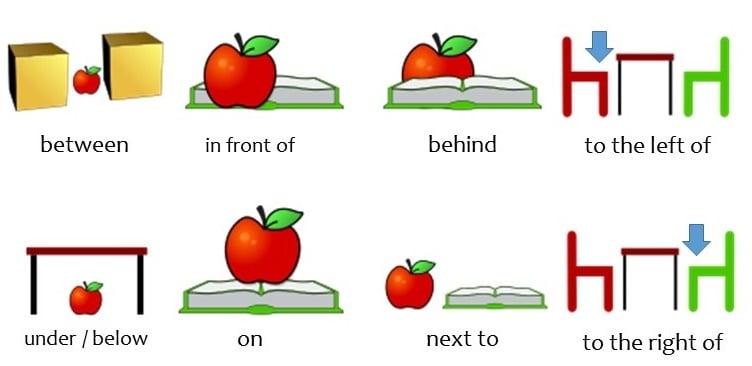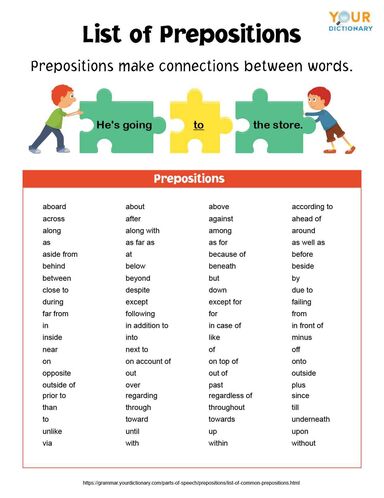

The difference between these two doesn’t necessarily change the meaning – someone is still riding the train – it’s just a difference of convention. For example, in French you say that someone is “in” a train, while in English you say that you’re “on” one. Usually, prepositions answer the questions “where?” and “which one?” Beware of Direct TranslationĪlthough French allows you to express the same types of spatial (e.g., beneath, above) and temporal (e.g., before, after) relations between objects, the correlations between prepositions is not one to one.Ĭertain French prepositions also do double duty (correlating to multiple English prepositions) and vice versa. Prepositional phrases can consist of multiple words, which, when combined, function as a preposition does. Common prepositions in English are: at, to, from, for, with, into, between, beside, under, and within. Prepositions describe movement, give us details on relations between objects, and provide a description of something/someone based on their location.
#CORRECT USE OF PREPOSITIONS HOW TO#
Good luck!īlog written by Joanna Hewson-Williams from the Gold Coast campus.Sur la table (“on the table”) but dans le train (“on the train”)? You may have noticed that French prepositions don’t translate directly, and, furthermore, there seem to be specific prepositions for different nouns! Read on to get a handle on the usual translations of prepositions and how to use some of the most common ones. Learning in phrases, however, means learners will make fewer errors. Learning prepositions in isolation is a daunting task, and more often than not there are exceptions to the rules. So to finish up with some words of wisdom: learners should not directly translate prepositions from their first language, but learn prepositions in conjunction with the surrounding words, forming set expressions. Learning prepositions as part of phrases and fixed expressions will help to improve a student’s proficiency and therefore lead to a better score in English exams. In the first example the preposition from collocates only with the verb suffer and in example two we use on with the adjective keen. In this example knowing the dependent preposition is the only way to answer the question. The importance of learning fixed expressions and collocation (words that go together) is evident when students want to take proficiency exams, in particular TOEIC or Cambridge ESOL Examinations.

Learning prepositions in sentences is the best way to avoid making mistakes In order to learn these types of preposition, learners must learn the language like children: in chunks. The cold hard truth, which no learner wants to hear, is that there are none. How does a learner know to use dream of, depend on or belong to? What are the rules for this? There is no denying that rules can help learners however these rules for prepositions of direction, place, position and time can work only for these instances. Children learn languages in chunks and phrases so English learners should do the same. This is not instinctive it has been acquired through hearing and mimicking, which is not the same way that students learn the language.

Ask an English speaking child, “Where is your mother?” They will know to say at home instead of in home or on home. Sure, we can give students rules to apply, such as use on with days of the week in for months and years at for specific times and holidays, but as native English speakers we do not grow up learning these rules, or even thinking about what preposition to use.

In English, to talk about something happening at a certain time we can say Most English learners have no problem directly translating prepositions from their native language into English, but this is where problems arise, as one preposition may correspond to several different prepositions in English. This shows how a preposition can completely alter the meaning of the sentence, proving that these little words must not be overlooked. In this case, it is the choice of preposition which tells the listener or reader if the mother is a patient at the hospital or just visiting. Does this mean that prepositions are not as significant as verbs? Or that they do not provide the listener or reader with important information? Prepositions are sometimes referred to as ‘function words’as opposed to nouns and verbs which are ‘content words’. For example, if you look up the word on in the dictionary you will be bombarded with many different definitions and uses, over 50 in fact! Prepositions can change the meaning of a sentence Even advanced English learners find prepositions difficult! One preposition in your own language might have a different translation in English depending on the context. Prepositions are one of the hardest things to learn in English.


 0 kommentar(er)
0 kommentar(er)
